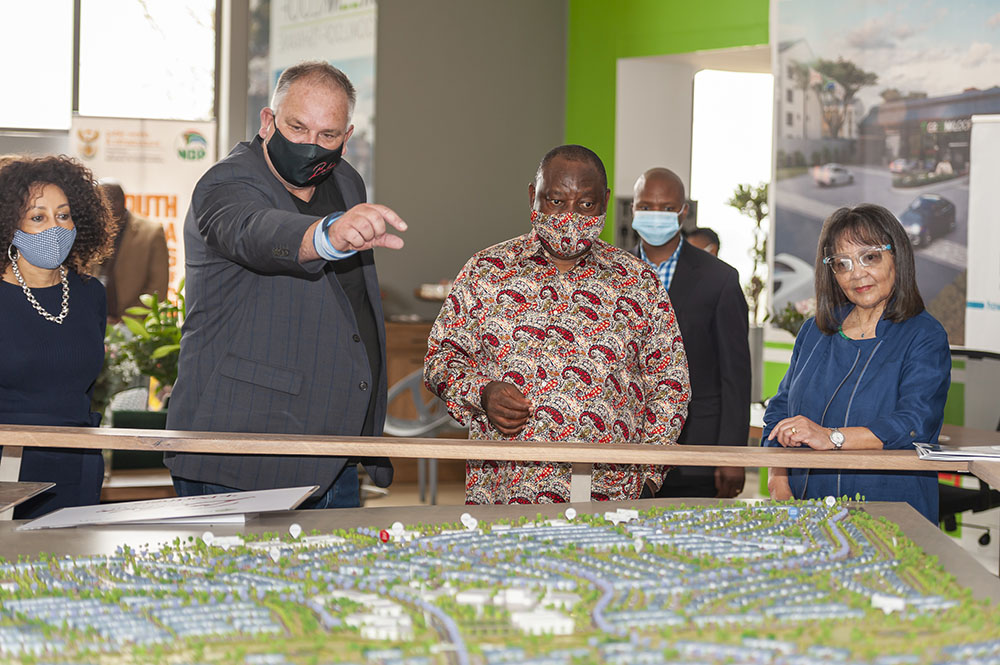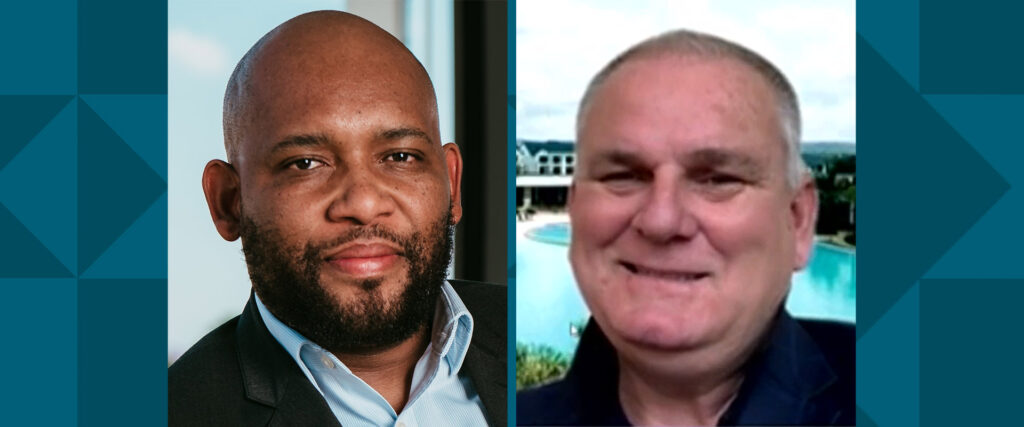MAIN IMAGE: Tholo Makhaolo, president South African Institute of Black Property Practitioners (SAIBPP); Steve Brookes, CEO Balwin Properties
The South African Institute of Black Property Practitioners (SAIBPP) called the government’s support of the Mooikloof MegaCity Development a ‘slap in the face of black contractors’. Are the concerns about a lack of prioritising of black-owned businesses justified?
SA’s huge housing backlog
South Africa has a massive backlog in the supply of affordable housing. According to the Centre for Affordable Housing Finance Africa (CAHFA) the housing backlog is currently estimated at between 2.3 million and 3.7 million units. Government has been playing catch-up since 1994, but at the current rate of delivery the state just is not able to meet the demand.
This is where public private partnerships come in. President Cyril Ramaphosa in May this year said stronger partnerships need to be forged between government and the private sector as this could help ‘resolve many of the country’s problems’. Read more: Ramaphosa sees ‘great value’ in private public sector partnerships
This was followed in June by the Sustainable Infrastructure Development Symposium (SIDS) where the president encouraged the private sector to approach government for support with infrastructure projects that will create much-needed jobs and help the economy grow to offset the devastating economic impact of the lockdown measures to curb the spread of the Covid-19 pandemic. The Mooikloof MegaCity is one of 62 strategic integrated projects (SIPs) that were gazetted at the end of July.
“Shovel-ready projects that have been fully developed for implementation will be the priority, ensuring ground is broken as soon as possible.” – President Cyril Ramaphosa, SIDS June 2020
Mooikloof MegaCity
Ramaphosa apparently sparked the initiative for the R84bn Mooikloof MegaCity project. Balwin Properties, a JSE-listed sectional title development company, has been incorporating inclusionary housing in its developments for some time. The President was the guest of honour at the launch of their Munyaka lifestyle estate in Midrand in March, and during his speech challenged Balwin to escalate its efforts and scale of inclusionary housing. This inspired the concept for what became the Mooikloof integrated development project – a public private partnership (PPP) between the Gauteng government, Tswane and Balwin.
Being a PPP, this means government is responsible for the installation of bulk infrastructure such as roads, water and sanitation, while Balwin will construct the residential apartments and lifestyle amenities at their own cost and risk. On Sunday 4 October the President with other dignitaries attended the official launch of the first phase of the project that will see 15 000 sectional title units built on a 200ha area east of Pretoria, with land already set aside for schools, shops and office buildings. The completed Mooikloof MegaCity is planned to have 50 000 apartments and thee development is expected to create thousands of jobs over the lifecycle of the project.

Picture caption: Balwin Properties CEO Steve Brookes explains the Mooikloof MegaCity development to President Cyril Ramaphosa during the launch. On Brookes’ left is Minister Lindiwe Sisulu and to the right of the President, is Minister Patricia de Lille.
B-BBPP empowerment concerns
SAIBPP president Tholo Makhaola this week publicly stated concern over the president’s support for the project citing lack of transformation and disregard for B-BBEE policies. While acknowledging the devastating effect that the pandemic has had on the economy, Makhaola warns against “creating jobs in the short-term at the sacrifice of the long-term imperatives that government has set for themselves and the country”. “The property and construction sectors continue to be hamstrung by a chronic lack of transformation,” he explained.
With reference to the Mooikloof project, he would expect that “a project of this magnitude , circa R84bn, that forms part of the state-led SIDs (Sustainable Infrastructure Development Symposium) programme should have clear, measurable targets with respect to black, female and youth participation at all levels of the value chain – all phases of the development including planning, construction and management thereof going forward”.
When asked to respond to SAIBPP’s concerns, Balwin Properties told Property Professional their company is 13.14% black owned and 6.15% black women owned. Although It does not currently have a BEE contributor status level, the company says they have taken major steps to improve this especially through procurement and supplier development. A new scorecard is expected to be available early in 2021 that will reflect the impact of these initiatives.
According to Balwin they give preference to black-owned and black women-owned businesses through its procurement strategy. Currently the company sub-contracts to over 77 black and black women-owned businesses. This ranges from construction and civils, electrical installations, and security, to air conditioning and telecommunications.
Balwin ends saying that they are open to engaging with the SAIBPP on their concerns.
Makhaola has made a call on the Office of the Presidency to ensure that going forward SIDS projects will prioritise black economic empowerment in the property and building sector. Granting of approvals and development rights must be contingent on meeting certain targeted conditions in terms of B-BBEE compliance and/or at least 40% procurement of all materials and professional services from black-owned and women-owned companies.
He says the SAIBPP supports the much-needed investment drive of the SIDS programme and they’re encouraged by the speed with which the Mooikloof MegaCity project happened, but going forward they want to see that no person, especially the many black property professionals in the property and built environment sector, should be left behind.
Others have full confidence that government will ensure black professionals get the necessary opportunities. Monedi Lefakane, chairman of Youth In Property Association (YIPA), had the following to say: “We would firstly like to congratulate the President and his government on the expeditious steps they are making to generate growth within our economy and the focus on the sector. It is a matter of concern that the private sector company in this project is largely untransformed company but we are confident that the government will ensure that black people, women and youth-owned businesses will be provided the adequate opportunities through this project because their inclusion in the value chain will only lead to further economic growth.
“This project offers an opportunity to address the unemployment concerns in the economy right now and the empowerment of black people not only through employment but also entrepreneurship and ownership in the long term.”








